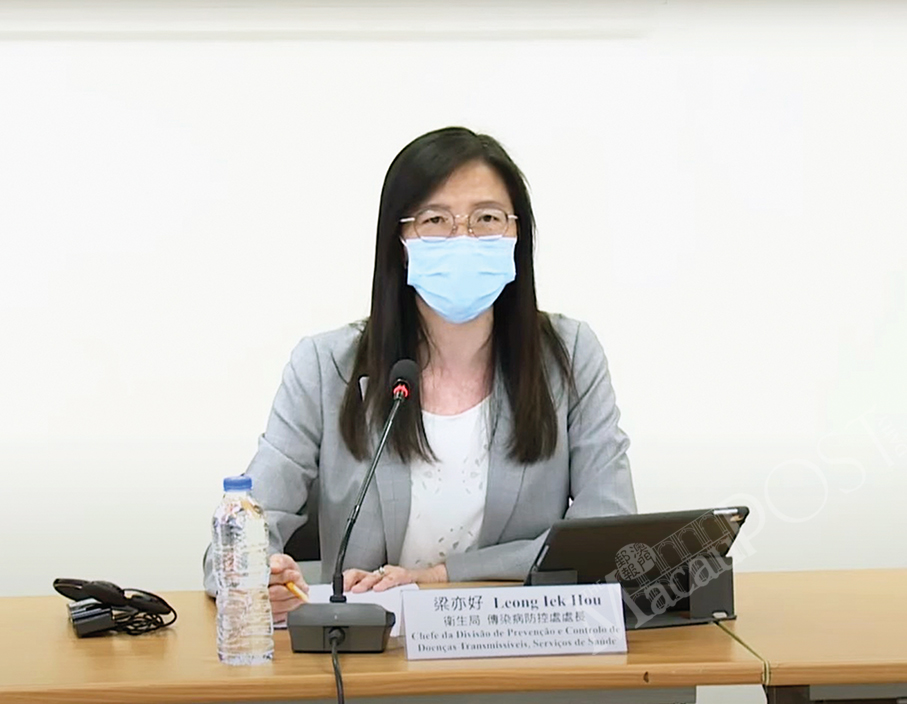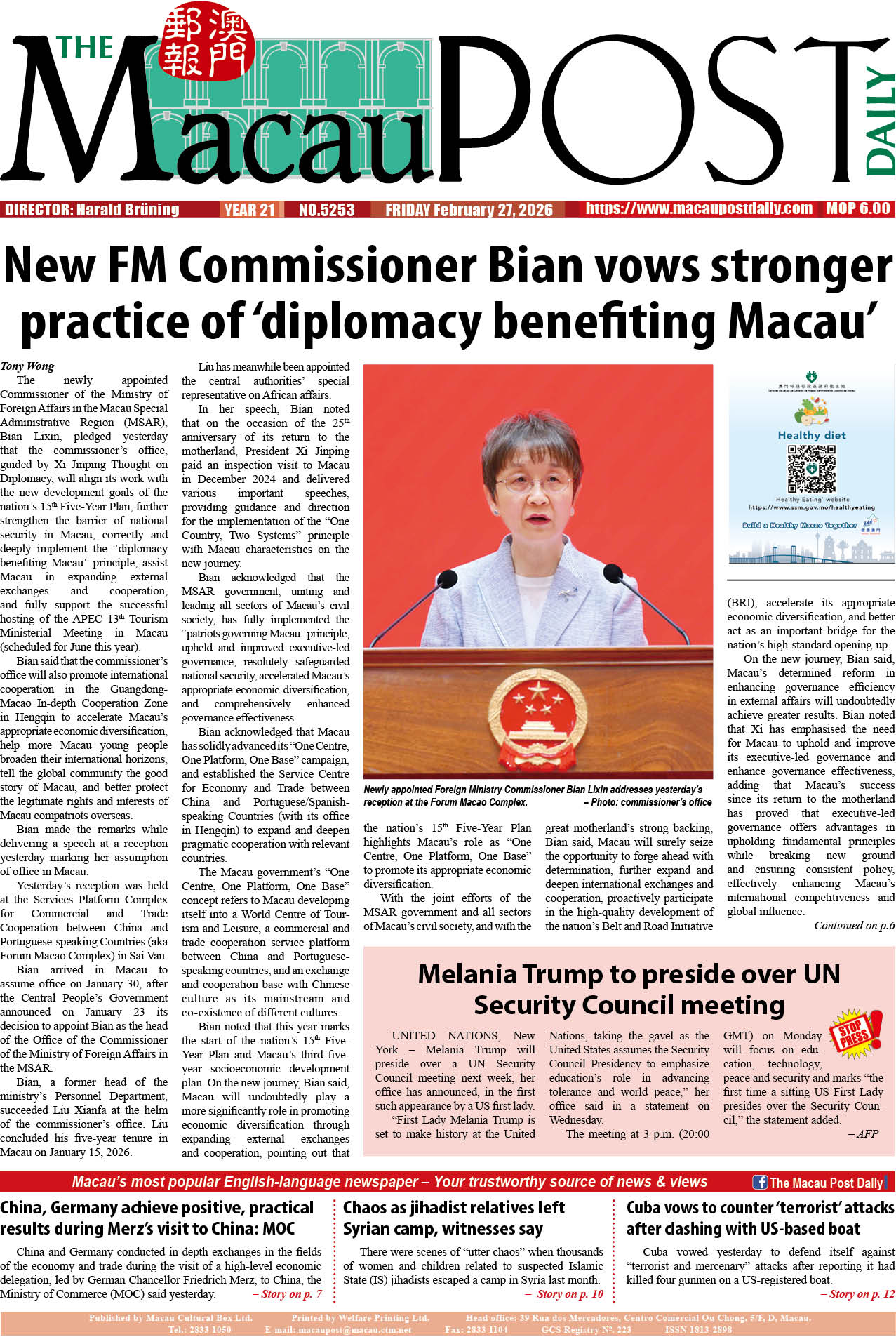The Macau government announced yesterday that it will once again allow Philippine nationals who have been hired by families in Macau as domestic helpers to enter Macau.
The applications for the new measure will start on April 25.
The new programme will only cover Philippine domestic helpers who have been hired to look after senior citizens aged 65 or over, children aged below three, or those with chronic diseases.
According to the new measure, those who are looked after by the domestic helpers, and those living with them – except those aged below three, must have received at least two COVID-19 jabs. Currently, those aged below three are not covered by the Macau government’s COVID-19 vaccination programme.
As with all the other arrivals from foreign countries, Philippine domestic helpers who have been granted permission to enter Macau will also be subject to the Macau government’s current requirement of 14-days in hotel quarantine plus seven-days “self-health management” upon their arrival here.
Also, as with all other arrivals from foreign countries, the Philippine domestic helpers must have received two COVID-19 jabs, and those who received their second COVID-19 jab over seven months ago must have received a booster shot, before boarding their flight en route to Macau.
Currently, only Macau residents, including foreign nationals holding a local ID card, are allowed to return to Macau from a foreign country.
According to the new measure, when submitting an application employers must promise that in case their domestic helpers who have completed their hotel quarantine are unable to pay the fee, they will pay the hotel quarantine fee for them.
Leong Iek Hou, who heads the Communicable Disease Prevention and Control Division of the Health Bureau (SSM), announced the new measure for Philippine domestic helpers during yesterday’s regular press conference by the Novel Coronavirus Response and Coordination Centre.
Due to the COVID-19 pandemic, foreign nationals without a Macau ID card have, in general, been barred from entering Macau since March 2020, regardless of whether they are willing to undergo hotel quarantine. However, foreigners currently can apply to enter Macau from the mainland or Hong Kong under certain special circumstances.
Application procedures
During yesterday’s press conference, Leong announced that the Macau government has decided to launch a pilot programme of granting Philippine domestic helpers’ exemptions from its current entry ban on foreign nationals without a Macau ID card.
According to Leong, local employers eligible for the new programme will have to submit their applications to the Labour Affairs Bureau (DSAL) – the government entity tasked with assessing local employers’ applications for permission to hire non-resident workers. After assessing the applications, the Labour Affairs Bureau will submit a list of employers who meet the programme’s requirements to the Public Security Police (PSP) – which run the city’s Immigration Department.
The respective employers will then have to apply for an “arrival notification” from the Public Security Police, only after which they can apply for an entry ban exemption from the Health Bureau for their domestic helpers, according to Leong.
Those who have been newly hired by employers in Macau as non-resident workers have to present an “arrival notification” to immigration officers upon their arrival in Macau.
Only after the Health Bureau grants the entry ban exemption, Leong said, can the respective employers book a quarantine hotel guestroom and an air ticket for their domestic helpers.
Since November last year, all those departing for Macau who are required to undergo hotel quarantine upon arrival here must book a guestroom before travelling to Macau.
App for applications
Leong said that the Health Bureau is developing a new mobile app for eligible employers to submit their applications, which is slated to start operating on April 25. Leong also said that the Health Bureau will announce details about the programme’s application on its website next Tuesday.
As with all other arrivals from foreign countries, Philippine domestic helpers who have completed their 14-day hotel quarantine in Macau will then be required to practise seven days of “self-health management”, during which their Macau Health Code colour will indicate yellow – which bars them from entering certain premises and facilities in the city and taking public transport.
Those practising their seven-day “self-health management” must undergo COVID-19 nucleic acid tests (NATs) regularly during the period, Leong pointed out.
In addition, Leong said, the Philippine domestic helpers must have a bedroom at their employer’s home only for them to stay during their “self-health management”, or alternatively they can choose to stay at a hotel earmarked for those with a yellow Macau Health Code.
Leong also reminded employers who have hired the Philippine domestic helpers to be “mentally prepared” for the possibility that domestic helpers who had previously been infected with COVID-19 may occasionally test positive for the novel coronavirus again within three months after their recovery, or within an even longer period.
The new programme announced yesterday will only be appliable to Filipines entering Macau from foreign countries, because foreigners in the mainland or Hong Kong have currently been able to apply to enter Macau for certain special circumstances.
Why Philippine maids first
Leong said that the Macau government has decided to run a pilot programme for Philippine nationals first because the Philippines’ health authorities are able to issue COVID-19 vaccination certificates that list more complete and accurate information, compared to the health authorities in other countries from where domestic helpers working for families in Macau normally come.
Leong said that the Macau government has decided to launch the programme as a pilot basis with the aim of enabling health officials to detect any possible problems resulting from the granting of entry ban exemptions for Philippine domestic helpers, including whether the application procedures can be run smoothly.
Leong also said that the pilot programme will enable health officials to assess whether allowing Philippine domestic helpers to enter Macau again would increase the level of COVID-19 risk to Macau.
For the next step, Leong said, the Macau government will study the feasibility of allowing foreign domestic helpers from other countries to enter Macau again after assessing how the pilot programme for Philippine domestic helpers has been operating. The local government will also study the possibility of allowing foreigners who have been hired by employers in Macau for other occupations to enter Macau again.
During yesterday’s press conference, Lei Sio Peng, who heads the Labour Inspection Department of the Labour Affairs Bureau, said that the new programme aims to resolve the current predicament in which local families who need domestic helpers are unable to hire them due to Macau’s current COVID-19 entry ban on foreign nationals without a Macau ID card.
Lei noted that currently Macau still needs to have strict COVID-19 prevention measures, because of which the government has decided that the programme will only cover families who have senior citizens aged 65 or over, children aged below three, or those with chronic diseases holding their respective health certificates.
Foreign educators & students
Meanwhile, Leong also announced that in the public interest, the Macau government will relax requirements for certain foreign nationals without a Macau ID card to be exempted from its current entry ban, such as foreign teachers needed by the city’s education sector (such as Portuguese teachers), senior management members of education institutions, and students enrolled in tertiary education institutions in Macau. Leong did not elaborate on the measure.

Leong Iek Hou, who heads the Health Bureau’s (SSM) Communicable Disease Prevention and Control Division, addresses yesterday’s press conference about the city’s COVID-19 situation.
Photo: GCS






